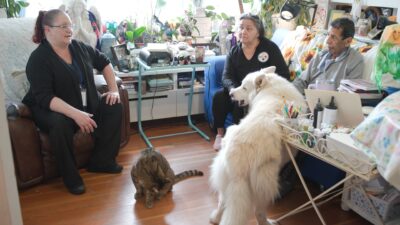Although grief is painful and can feel disabling, most people who experience loss return to their pre-loss level of functioning, or even improved functioning, within several months.
However, some people need additional support. Underlying medical conditions, your personal history and external support systems, the type of loss and variables in the relationship all play a role in determining how you adjust to and cope with loss.
When to seek help
Grief experts generally agree that if your grief is unmanageable, or you have not returned to your pre-loss level of functioning within six to 12 months after a loss, it is time to seek help from a grief counselor or other trained professional.
It is natural to experience waves of grief even years after a loss. But if you, your friends, or your family are concerned about how you’re adjusting, a professional evaluation may be important.
If you or someone you know is contemplating self-harm, contact the Suicide and Crisis Lifeline by calling or texting 988.
Signs that you may need help adjusting to loss include:
- Extreme sadness or anxiety.
- Preoccupation with the deceased or how they died.
- Difficulty functioning in relationships.
- Difficulty functioning in key roles at work, home, or school.
- Recurring nightmares.
- Guilt or self-blame; destructive or self-destructive thoughts or behaviors.
- New physical ailments or physical pain; new insomnia or extreme weight loss.
- Intense loneliness and/or emotional pain; persistent longing or yearning for the deceased.
- Numbness or hopelessness.
- Inability to communicate about the person who died.
Prolonged grief disorder
After years of research, prolonged grief disorder (PGD) was included in the most recent edition of the manual that mental health professionals in the United States use to identify psychiatric disorders.
It is estimated that up to about 10%- 15% of bereaved individuals experience this newly diagnosable disorder. According to the manual, a diagnosis of PGD requires:
- The death of a person close to the bereaved at least 12 months ago (six months for children).
- Persistent, pervasive yearning, longing, or preoccupation with the deceased.
- At least three of the following symptoms present on most days since the death to a clinically significant degree, and every day for at least the past month:
- Identity disruption, such as feeling as though a part of you has died.
- A marked sense of disbelief about the death.
- Avoidance of reminders that the person is dead.
- Intense emotional pain (such as anger, bitterness, or sorrow) related to the death.
- Difficulty with reintegration, such as problems engaging with friends, pursuing interests, or planning for the future.
- Emotional numbness; absence or marked reduction of emotion.
- Feeling that life is meaningless.
- Intense loneliness; feeling alone or detached from others.
- Clinically significant distress or impairment in personal, family, social, educational, occupational, or other important areas of functioning.
- Bereavement that lasts longer than expected based on cultural, social, or religious norms for the person’s culture and context.
Use a screening tool for prolonged grief disorder developed by the Center for Prolonged Grief at Columbia University.
There is help for PGD: An evidence-based treatment protocol that includes one-on-one sessions has been developed to treat people with prolonged grief. Researchers are looking for ways to make this protocol more widely available in grief support group settings.
Learn more about prolonged grief and find counselors trained in the PG treatment protocol.
Depression or prolonged grief?
Many people wonder if they are depressed when they experience PGD or other grief complications.
Although some of the feelings can appear or feel the same, prolonged grief and depression are different. The two conditions also can coexist — a situation more prevalent in people with a history of depression.
Unlike depression, no medication has been shown to be effective for prolonged grief, but there are effective interventions.
| Depression: | Prolonged Grief: |
| Sadness; inability to experience pleasure with people or activities. | Yearning and longing for the person who died. |
| Profound feelings of dissatisfaction and unhappiness. | Painful waves of emotion. |
| Wide-ranging guilt. | Loss-related guilt. |
| Repeated thinking related to feeling worthless or hopeless. | Repeated, frequent thoughts related to possible alternatives; self-blame, anger. |
| Suicidal thoughts motivated by low self-worth and/or hopelessness. | Suicidal feelings related to yearning for reunion or not wanting to live without the deceased. |
Other grief complications
Other conditions can complicate, overlap with, and underlie a person’s grief. They may include post-traumatic stress disorder (PTSD), anxiety, and/or attachment disorder, which may be related to the loss itself.
Someone with a clinical education — for example, a psychiatrist, psychologist, social worker, or counselor — can help you understand the interplay of these disorders and their relationship with grief.
If you are concerned that your grief may be complicated, reach out to a trained grief professional for help.


